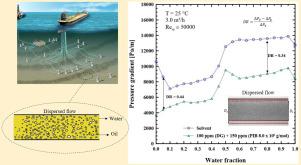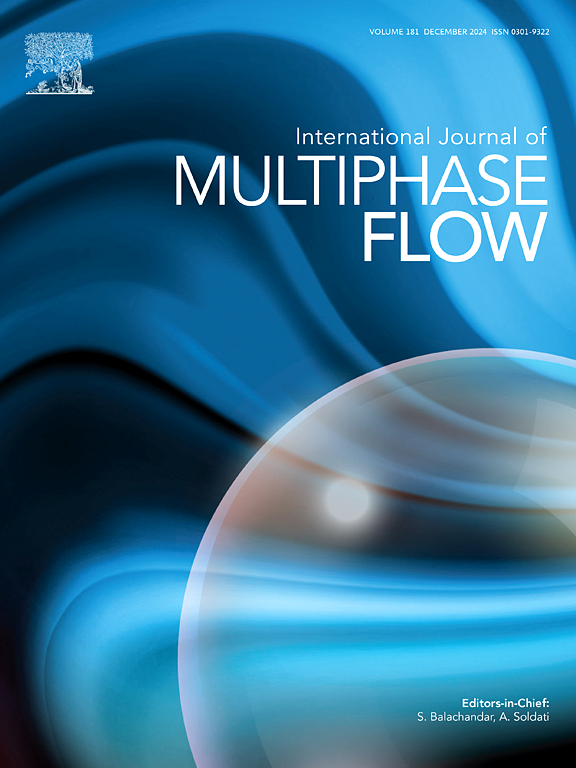Polymer drag reduction in dispersed oil–water flow in tubes
IF 3.6
2区 工程技术
Q1 MECHANICS
International Journal of Multiphase Flow
Pub Date : 2024-11-28
DOI:10.1016/j.ijmultiphaseflow.2024.105064
引用次数: 0
Abstract
Drag reduction by polymers is a critical issue, with several applications first reported more than 70 years ago. The number of related works is vast, but most are restricted to single-phase flow. The few available works treating two-phase flow use drag reducers only in the water phase. One goal of the present work is to study the role of polymer additives in both phases for a range of water fractions. We conduct the main tests by considering the pressure drop in a fully developed turbulent flow in a pipeline and fixing each phase flow rate. In our tests, the pressure drop depends on the water fraction, mixing viscosity, mean phase densities, polymer concentration, and molecular weight. It is worth mentioning that, in small concentrations, the water drops also work as a drag reducer. We conduct the tests to compare the role of polymers in single and two-phase flow, paying particular attention to mechanical polymer degradation. Our main conclusion is that drag reducers are effective only in the external phase. In our tests, the water drag reducer is effective for water fractions larger than 0.5, and the oil drag reducer for water fractions smaller than 0.5. When both phases contain additives, the pressure drops, relatively to the case in the absence of additives, for an entire range of water fractions.

聚合物在分散油管油水流动中的减阻作用
聚合物减阻是一个关键问题,70多年前就有一些应用首次报道。相关著作数量庞大,但大多局限于单相流。少数处理两相流的工程只在水相使用减阻剂。本工作的一个目标是研究聚合物添加剂在两相中对一系列水馏分的作用。我们通过考虑管道中完全发展的湍流中的压降并确定各相流量来进行主要测试。在我们的测试中,压降取决于水分数、混合粘度、平均相密度、聚合物浓度和分子量。值得一提的是,在小浓度的情况下,水滴也可以起到减阻的作用。我们进行了测试,以比较聚合物在单相和两相流中的作用,特别关注机械聚合物降解。我们的主要结论是,减阻器只在外部阶段有效。在我们的试验中,水阻减速器对大于0.5的水分数有效,油阻减速器对小于0.5的水分数有效。当两相都含有添加剂时,在整个馏分范围内,相对于不含添加剂的情况,压力下降。
本文章由计算机程序翻译,如有差异,请以英文原文为准。
求助全文
约1分钟内获得全文
求助全文
来源期刊
CiteScore
7.30
自引率
10.50%
发文量
244
审稿时长
4 months
期刊介绍:
The International Journal of Multiphase Flow publishes analytical, numerical and experimental articles of lasting interest. The scope of the journal includes all aspects of mass, momentum and energy exchange phenomena among different phases such as occur in disperse flows, gas–liquid and liquid–liquid flows, flows in porous media, boiling, granular flows and others.
The journal publishes full papers, brief communications and conference announcements.

 求助内容:
求助内容: 应助结果提醒方式:
应助结果提醒方式:


